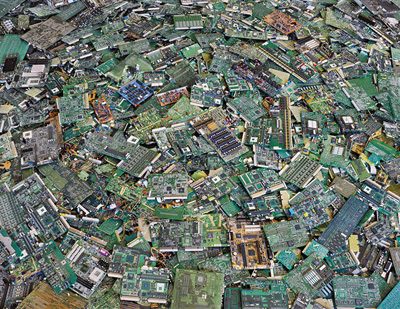Often when we think about the reasons to digitise magnetic tape collections we are considering the future. We digitise to make material accessible so it can be used again, or to preserve it so subsequent generations can benefit or learn from it. But how sustainable is digitisation and digital technology? What is the ecological impact of the widespread and breathtakingly fast adoption of digital technologies since the late 1990s?
At an everyday, consumer level, the use of digital technologies comes with real human and environmental costs, as Professor Toby Miller and Professor Richard Maxwell demonstrate in a recent article in The Guardian. They argue that the very metaphors we use to describe digital media – ‘virtual,’ ‘cloud’, ‘streams’ and ‘mobiles’ – dangerously obscure the fact they come from materials, such as the minerals Tatalun, Tungsten, Tin and Gold, and cover up the exploitative labour conditions, and war torn situations from which they are extracted:
‘Suggestions that we live in a dematerialised world are not only exaggerated; they are doing more harm than good. One person’s cloud is another’s pollution, and one person’s mobile is another’s enslavement. From electronic waste to conflict minerals, the new media leave an indelible mark on bodies and the Earth they inhabit.’
The extent of violence and exploitation that lie at the end of the digital supply chain is hardly a secret. At a consumer level there seems to be very little resistance to the use of mobile digital devices, probably because our very social existence is dependent upon them in a culture where media is pervasive. It is not easy to opt out, and what would you do if you did?
As heavy users of digital technologies we walk with our heads in the clouds, so to speak, unable to access the wider environmental impact of our actions. This impact is intensified by the pressure to continually upgrade our devices, as Dr Chris Priest writes,
‘the regularity with which you replace a device becomes more important in determining the overall footprint of the device. If we take a hypothetical device with a 50% use footprint, and replace it after two years rather than three, then it will increase our overall footprint by 25%. Of course, new devices might be becoming increasingly efficient and this could offset the increase to some extent. Though even if the new device used no power, it could not offset it completely.’
Yet these are speculations not empirical fact. It is hard to know concretely what the environmental consequences of becoming immediate adopters of the latest (fastest, smallest, bestest) digital technologies are. One thing is certain, new goods will appear and people will be told they can’t live without them. This is how an economy driven by innovation works.
Thinking about the uptake of digital technologies at an institutional level, it is clear that within a technological climate pre-disposed to the production of ‘digital waste’ and obsolescence, the mismanagement of energy resources in order to keep digital data ‘alive’ (that is useable, accessible) is a real possibility. One only need turn to the financial and technological waste produced from the BBC’s Digital Media Initiative (DMI) to confirm that the creation of technical systems devised to manage large digital archives are not moving at the same relentless speed as the neoliberal market.
Which begs the question: can there be an ecological solution to the problem of digitisation, and the use of digital technologies in an innovation/ obsolescence economy? Can digitisation ever be energy efficient, non-exploitative and flexible enough to cope with the technological changes that will inevitably happen? What would a sustainable and ethical approach to digital information management look like?
As our world gets increasingly networked these are pressing questions effecting everyone. And clearly understanding the wider impact of the use of technology on people and the earth is a serious issue, usually forgotten when scrolling through data feeds in a voracious, but often distracted, manner. These are admittedly big questions and we welcome comments, links and ideas on how to answer them.
As keen hoarders of mechanical waste from the analogue era who are passionate about making data accessible in digital form, we are contributing to a world that places unprecedented value on technological information.
Need this, however, always be at the expense of people and the world we share as currently it seems to be?
